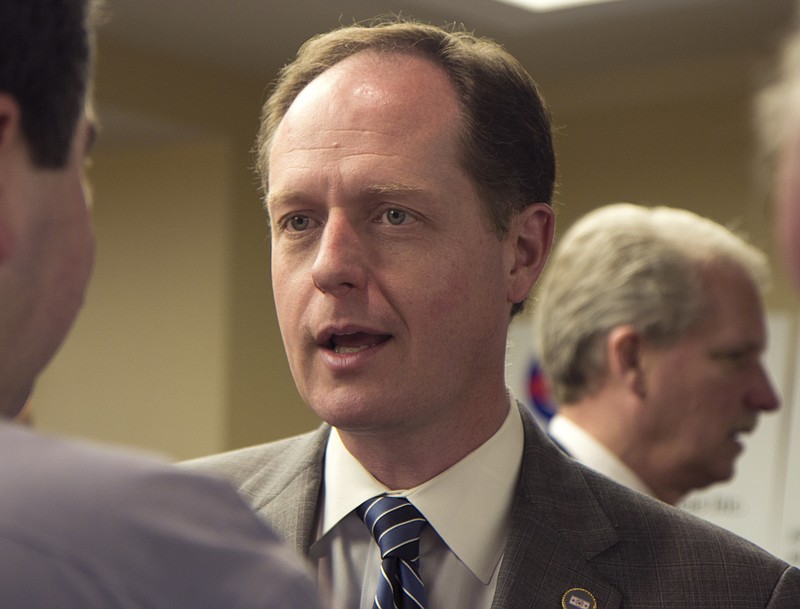NASHVILLE - A controversial bill that would let Tennessee therapists and marriage counselors with "sincerely held" religious beliefs turn away gay patients without risk of legal consequences easily cleared a state Senate panel Wednesday.
Senate Health and Welfare Committee members approved the measure on a 7-1 vote with the lone Democrat voting no.
The bill seeks to protect conservative therapists from 2014 changes in the American Counseling Association's code of ethics. The changes direct that "counselors refrain from referring prospective and current clients based solely on the counselor's personally held values, attitudes, beliefs and behaviors."
While it doesn't mention lesbian, gay, bisexual and transgender persons, the Tennessee Equality Project, which advocates for gays, said that's the bill's motivation.
Sen. Jack Johnson, R-Franklin, said he brought the bill in response to concerns raised by a practitioner in his Middle Tennessee district.
The bill says that so long as the reluctant practitioners refer the client to another qualified professional, they will be protected from suspensions as well as any legal penalties.
The Tennessee Association for Marriage and Family Therapists opposes the legislation.
"This bill is in direct opposition to the ethical code of the American Association of Marriage and Family Therapy and potentially harmful to clients," the group said in a statement. "Our mandate to do no harm to the consumer, we believe, would be violated."
Several therapists objected to the legislation in testimony before the committee with one saying, "They can keep their belief system and still offer good counseling but not based on their religious beliefs."
Johnson said, "I appreciate their thoughts and their input. I'll just say that there are plenty who are in their profession across the state, many of whom have contacted you, who have a starkly different viewpoint of this bill."
He said a referral profession, which not specifically defined, is "to make sure the individual gets the help that they need. And just as a physician has ways of referring someone to a different physician, but ultimately you want to make sure the patient gets the help that they need. And the same is true with the counselor and therapists."
Committee Chairman Rusty Crowe, R-Johnson City, noted that while the "prime directive is to serve people," he believes "we have a duty to protect the beliefs of people and that's where we are."
"I don't see the big deal here," he said.
Sen. Jeff Yarbro, D-Nashville, objected to not hearing from actual professional organizations on the proposed law.
"I have a lot of difficulty seeing how we make this big of an ethical decision on the legal rules and the ethical rules that apply to a pretty big swath of health providers without hearing from professional organizations," he said.
Yarbro noted the testimony from some of the therapists saying a change in law isn't needed and there are "ways to work around" the issue.
"There are dangers and potential discrimination that extends beyond any particular issue but could actually limit the availability of emergency care that we'd all like to see," Yarbro added.
Speaking with reporters later, Chris Sanders, the executive director of the Tennessee Equality Project, said it could stigmatize gays, including youths, seeking help.
"That's our concern," he said. "The way it is now, counselors can't say, 'You know what? I have a religious disagreement with you and I'm not going to serve you.' They can't do that right now. And under this bill, all they'd have to do is cite their religion."
David Fowler, president of the conservative Family Action Council of Tennessee, said the reason the national therapist organization changed the ethics code was because of a ruling by the U.S. 6th Circuit Court of Appeals.
The appellate court ruled in favor of an Eastern Michigan University graduate student who was expelled from the university's counseling program following a disciplinary hearing after she was asked to counsel a gay client. The woman asked to refer the person to someone else or be able to make a referral if the counseling turned to relationship issues. Judges said university rules did not bar referrals.
"So they [therapists' group] passed the new rule specifically to circumvent the 6th Circuit Court ruling," Fowler said.
Sen. Bo Watson, R-Hixson, voted for the bill. The House measure is sponsored by Rep. Dan Howell, R-Georgetown.
Contact Andy Sher at asher@times freepress.com, 615-255-0550 or follow via twitter at AndySher1.
